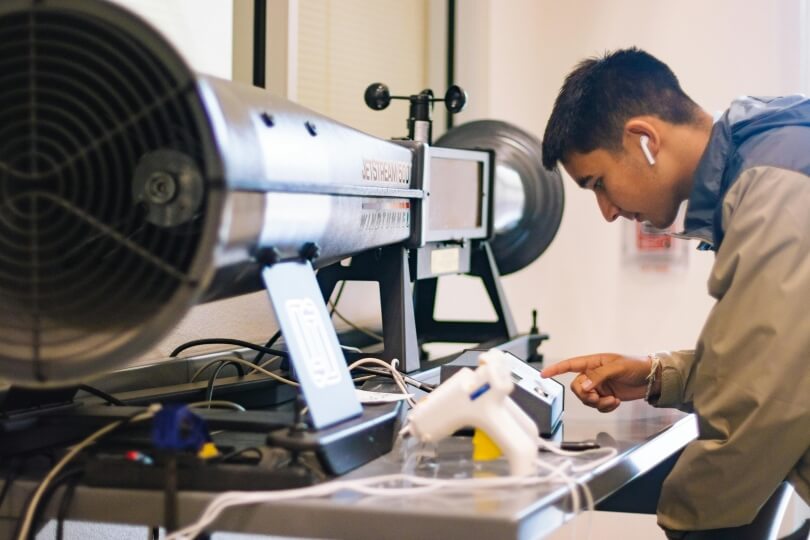Table of Contents
- What Can I Do With a Degree in Data Science?
- Overview of Data Science as a Field
- Top Career Paths for Data Science Graduates
- Harvard SEAS-Specific Research and Educational Opportunities
- Tips for Getting Started in Data Science Careers
- Final Thoughts on Building a Successful Data Science Career
What Can I Do With a Degree in Data Science?
While some students enter their studies with a clear goal in mind, many start without a set path, eager to uncover where their interests might lead. Even those with defined career goals sometimes find their perspectives shifting as they encounter new information along the way.
This fluidity is particularly relevant in data science—a field that offers students a chance to shape their future in ways they may not have initially imagined.
With a projected employment growth of 36 percent from 2023 to 2033, making it one of the fastest-growing fields, data science presents exciting career opportunities for those passionate about making an impact through data.
Key Takeaways
- Data Science Career Paths: From technology and finance to healthcare and beyond, a degree in data science will introduce you to many opportunities within and beyond the traditional data science careers.
- Essential Skills: Mastery of core technical skills like programming, machine learning, and data analytics is crucial, complemented by strong problem-solving, communication, and critical thinking abilities.
- High Demand: Over the decade, about 20,800 openings for data scientists are projected each year.
Overview of Data Science as a Field
Data science is known as the practice of transforming collected data into meaningful insights.
What makes it stand out is its versatility and far-reaching impact. Data science helps tackle and solve many issues, from predicting disease outbreaks to crafting personalized customer experiences.
What is data science?
Data science involves building, cleaning, and organizing large datasets to analyze and derive meaningful insights. For instance, in retail, data science helps gather and analyze large transaction datasets from millions of customers to identify buying patterns, which guide inventory planning and marketing strategies.
At its core, data science is an interdisciplinary field that combines:
- Statistics for understanding data
- Programming to help with data manipulation
- Machine learning and algorithms to find hidden insights
- Domain expertise to ensure that the analysis is both relevant and impactful
Why a career in data science?
Organizations are increasingly depending on data-driven insights to help with decision-making. This dependency has positioned data science as one of the most in-demand career paths. More specifically, roughly 20,800 data scientist job opportunities are projected every year over the next decade.
The strength of a data science career goes beyond the high demand. A degree in data science equips students with problem-solving skills and critical thinking that extend well beyond traditional roles like data scientist, data engineer, or machine learning specialist. Erin Williams, a Harvard SEAS alum and a division operations research and systems analyst (ORSA) for the Army's 101st airborne division out of Fort Campbell North in Kentucky, puts it best:
"I get a new problem set every day, and I get the chance to see how the work I do actually changes the organization."
Her experience is a great example of how data science is about solving real problems and making an impact, whether in the military, healthcare, finance, or tech.
Former data scientists often move into product management, strategy consulting, or executive leadership roles and use their broad knowledge to approach problems systematically and make data-driven decisions.
The diversity of industries that employ data scientists is further illustrated by the Bureau of Labor Statistics data, which reports that as of 2023, there were around 202,900 data scientist jobs across various industries, with 11% in computer systems design, 10% in insurance, 9% in company management, 6% in consulting, and 5% in scientific research.
Whether graduates remain in data-focused roles or pivot into leadership or strategy, the skills developed through a data science degree make them an essential part of any industry.
Top Career Paths for Data Science Graduates
With skills in data analysis, machine learning, and statistical modeling, data science graduates are able to make a big impact in fields from tech and finance to healthcare. That said, let's take a look at some of the top career paths for data science graduates.
Data analyst
A data analyst is the driving force behind data-driven decision-making. These individuals primarily focus on interpreting and reporting historical data. Their main responsibility is analyzing trends and patterns to produce insights that inform business decisions. They handle structured data, develop visual representations, and create reports that help stakeholders interpret past events and understand the reasons behind them.
Here's how they contribute to different sectors:
- In finance, data analysts assess market trends, forecast economic outcomes, and refine investment strategies to minimize risks and identify opportunities.
- As part of the healthcare industry, they enhance patient care by analyzing treatment outcomes, streamlining processes, and interpreting clinical trial data.
- In the technology sector, analysts study user behavior, improve products, and enhance customer engagement.
- E-commerce gains from a data analyst's expertise in forecasting consumer trends, optimizing supply chains, and personalizing shopping experiences.
To excel as a data analyst, a diversified skillset that combines strong technical competencies with interpersonal strengths, including the following, is necessary:
- Programming proficiency in Python, R, and SQL
- Expertise in data visualization tools
- Advanced knowledge of statistical methods and predictive modeling
- Strategic thinking to uncover meaningful patterns and opportunities
- Clear and persuasive communication tailored to diverse audiences
- Resourceful problem-solving grounded in actionable insights
- Flexibility to embrace emerging tools and industry trends
As data analysts improve their skills and acquire experience, they have the opportunity to advance into jobs with greater responsibility and influence. Here's the typical career path for data analysts:
Junior Data Analyst → Data Analyst→ Senior Data Analyst →Analytics Manager
A real-world example of a data analyst's impact can be seen in the healthcare sector, where they monitor hospital admission rates and recovery metrics. By analyzing this data, they can identify inefficiencies, such as extended patient stays or bottlenecks in emergency care.
Data scientist
Data scientists use advanced models and machine learning to forecast future trends and tackle complex challenges. They work with both structured and unstructured data, often developing hypotheses, running experiments, and building predictive models. Their work connects understanding past patterns with generating insights that guide future decisions.
A degree in data science enables graduates to become valuable in numerous industries, each offering unique opportunities to apply their expertise, including:
- Business services
- Marketing
- Government
Their role in these industries demands the perfection of these key skills, among others:
- Advanced statistical knowledge
- Machine learning
- Programming proficiency (Python/R)
- Data visualization
As data scientists gain experience, they often move into higher-level roles. The most common career progression of a data scientist is as follows:
Junior Data Scientist → Data Scientist → Senior Data Scientist → Lead Data Scientist → Chief Data Scientist
An example of their work would be the collaboration with health researchers to create programs that predict the short- and long-term health effects of specific variables, allowing the identification of at-risk populations, preventative measures, and long-term care needs.
Machine learning engineer
Machine learning engineers are highly skilled programmers who develop artificial intelligence (AI) systems that learn from large datasets and make accurate predictions. They create self-running software to automate predictive models, transforming research into practical applications.
While data scientists often focus on building and refining models, machine learning engineers take these models a step further—designing, deploying, and maintaining scalable systems that integrate machine learning algorithms into real-world environments, with a strong emphasis on performance, reliability, and efficiency.
This profession is in high demand across various industries, including:
- Tech companies
- Finance
- Autonomous systems
- Robotics
Developing strong technical skills is essential to succeed in any of the mentioned industries. Key ones include:
- Deep learning frameworks (TensorFlow, PyTorch)
- Programming (Python)
- Algorithms
The standard career path for machine learning engineers is as follows:
Junior Machine Learning Engineer → Senior Machine Learning Engineer → AI Specialist
Image recognition in self-driving cars is an excellent example of machine learning in action. The machine learning systems employ image recognition algorithms trained on large datasets of traffic lights, people, road signs, and other objects, allowing the car to reliably recognize them in a variety of settings. Over time, as more data is collected, the system learns and improves, reducing the chance of errors and improving the safety of the vehicle.
Data engineer
Data engineers provide the foundational infrastructure that supports the entire data life cycle. They design and manage data pipelines, ensure data quality, and integrate data from various sources. Their work enables data analysts, data scientists, and machine learning engineers to access reliable, high-quality data for their tasks. Data engineers are the architects of the data ecosystem, ensuring that data flows seamlessly and is accessible for analysis and modeling.
The most common industries where these professionals thrive include:
- Large-scale tech
- Logistics
- E-commerce
Database management, ETL processes, and cloud services are among the key skills required to succeed in any of the industries mentioned.
Enhancing these skills and tackling more complex projects enables data scientists to advance their careers. Their typical career progression follows this pattern:
Data Engineer → Senior Data Engineer → Data Architect
For example, data engineers are critical in creating pipelines that feed real-time user data to machine learning models. These models offer suggestions and recommendations based on individual preferences.
Business intelligence (BI) analyst
Whether identifying trends, optimizing processes, or forecasting future outcomes, BI analysts act as the bridge between business data and actionable business strategies. Their work ensures businesses remain competitive in the market.
The demand for BI analysts has surged across various sectors, including but not limited to:
- Retail
- Finance
- Logistics
Essential skills for success in this role include:
- BI tools: Mastery of tools like Power BI and Looker for creating dashboards and reports
- Data warehousing: Understanding how to efficiently store, organize, and retrieve large datasets
- SQL: Proficiency in querying and manipulating data for analysis
The career path for a BI analyst offers numerous growth opportunities, with a natural progression into roles that involve deeper expertise and higher responsibility:
BI Analyst → Senior BI Analyst → BI Manager / BI Developer → Head of BI / Director of Analytics
For instance, a BI analyst might develop dashboards using tools like Power BI or Tableau to visualize monthly sales performance across different regions, identify key trends, and report these findings to the sales leadership team to help them understand performance drivers and allocate resources.
Market research analyst
Market research analysts provide valuable insights that shape marketing strategies by analyzing consumer behavior and market trends.
Key industries that rely heavily on the expertise of market research analysts include:
- Marketing: Crafting targeted campaigns and identifying new opportunities.
- E-commerce: Understanding online consumer behavior and optimizing sales strategies.
- Retail: Analyzing purchasing patterns to improve product offerings and customer engagement.
To succeed in their role, professionals need a combination of research and analytical abilities. Market research methods, data analysis skills, and Excel are critical for success. Depending on the specific role, familiarity with statistical software packages or advanced survey tools may also be valuable.
The career path for a market research analyst offers growth into these roles:
Market Research Analyst → Senior Analyst → Market Research Manager → Market Strategy Consultant
One of the many examples of market research analysts' roles is in the e-commerce sector, where they analyze customer reviews and purchasing trends to identify popular products. This insight guides inventory decisions and informs promotional campaigns, ultimately driving sales and customer satisfaction.
Specialized roles in data science
Data science spans a variety of specialized roles—each with distinct responsibilities, focus areas, and skill requirements. Here are a few of the most common:
Data ethics officer
Data ethics is a multidisciplinary field that explores how technology affects society as a whole and offers suggestions for data professionals and technologists. It has seen tremendous success in recent years and has played a key part in the development of artificial intelligence (AI) and high-risk data products.
A thorough grasp of data governance frameworks, AI ethics, and legal compliance is essential for professionals in this industry. Their work can include developing and managing data privacy frameworks for AI-driven healthcare diagnostics, balancing the need for accurate medical predictions with stringent patient confidentiality standards.
Robotics and AI engineer
The integration of AI into robotics has transformed industries by enabling systems to operate autonomously and adapt to real-world complexities. Professionals in this field design and build intelligent robotic systems that combine AI-driven decision-making with traditional engineering principles.
Among the skills needed to succeed in this role are proficiency in machine learning, programming languages such as C++ and Python, and a solid foundation in engineering concepts.
An example of work in this field includes creating robots for advanced manufacturing that can adapt to unpredictable scenarios, such as handling irregularly shaped objects or responding autonomously to
Harvard SEAS-Specific Research and Educational Opportunities
Harvard John A. Paulson School of Engineering and Applied Sciences (SEAS) provides the perfect environment for aspiring data scientists to develop the skills essential for success in the field. Harvard SEAS students enjoy unparalleled opportunities to shape their careers and contribute to transformative advancements in data science through cutting-edge research labs and personalized mentorship from globally renowned faculty.
Building on this foundation of innovation and support, SEAS takes collaboration to the next level by blurring the lines between traditional departments. Doing so creates a space where students, researchers, and faculty can work together across disciplines to tackle the world's biggest problems.
A big part of this is the groundbreaking work being done by SEAS faculty. Their research spans areas like data science, bioengineering, and sustainable technology, offering students the chance to learn from and contribute to projects at the forefront of innovation. If you're curious about the exciting work happening here, we encourage you to explore Faculty & Research
Learn about Harvard's Data Science Masters program
Tips for Getting Started in Data Science Careers
Breaking into the field of data science demands deliberate action, focused preparation, and a willingness to adapt to changes. Regardless of the path you choose to take, there are some key steps you must follow:
Take relevant courses
The first step to getting started in data science is choosing the right coursework. Programs that center on practical applications of core tools such as Python, SQL, and machine learning provide a focused and efficient path to mastering essential skills without the inefficiencies of fragmented learning. Additionally, Harvard provides access to online courses and resources to help students deepen their knowledge from the comfort of their own space.
If you are seeking more than online courses and want to pave your way into advanced proficiency, graduate programs, such as the Harvard SEAS Master's in Data Science, offer a comprehensive blend of theoretical understanding and applied learning. Through rigorous academic training alongside hands-on research and project work opportunities, this program will prepare you for any complex, data-driven challenge in different professional environments.
Gain real-world experience
While theoretical knowledge establishes a conceptual framework, practical experience bridges the gap between learning and application. Internships, entry-level positions, and freelance projects are critical to understanding industry expectations.
The structured integration of practical experience can include:
- Developing independent projects to demonstrate applied knowledge, such as creating predictive models or data visualizations using publicly available datasets.
- Participating in data science competitions and collaborative platforms to gain exposure to diverse challenges and techniques.
- Engaging in internships or freelance roles that align theoretical skills with industry-specific needs in order to create professional networks.
Consider specialization
While foundational skills and hands-on expertise provide versatility, specialization helps you to stand out and focus on high-impact areas.
As industries become more data-driven, areas like AI ethics, environmental data science, and advanced machine learning are getting more attention for their ability to solve complex problems. Focusing on any of these in-demand specialties is advisable.
Final Thoughts on Building a Successful Data Science Career
A career in data science offers boundless opportunities for growth and innovation, especially for graduates of highly esteemed institutions like Harvard SEAS.
Harvard SEAS graduates stand out not only because of the rigorous academic foundation they receive but also due to the unparalleled resources and networks they can access. Harvard SEAS equips students with cutting-edge technical skills through world-class coursework, hands-on research opportunities, faculty research, and mentorship from globally renowned faculty.
To succeed in data science, you need to cultivate a love for learning, take on challenges, and stay connected with a network of like-minded individuals. With focus, curiosity, and a growth mindset, you can help shape the world for decades to come. The future of data science is as vast as the data itself—and your potential within it is limitless.







